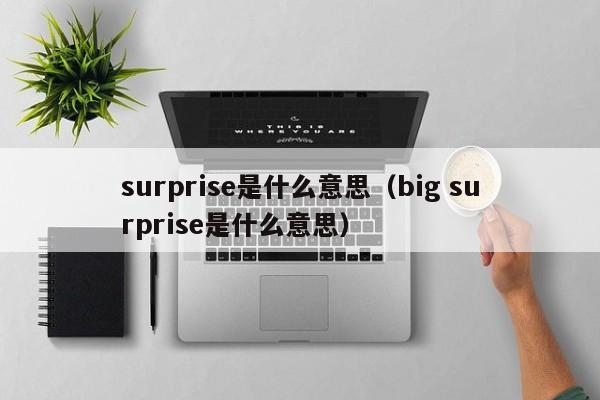本文目录一览:
surprise的意思
surprise:英 [səˈpraɪz] 美 [sərˈpraɪz]
n.惊讶,惊奇;意外;意想不到(或突然)的事,令人惊奇的事(或消息等);出人意表的做事方式,出奇制胜的策略;意想不到的礼物
v.(使)吃惊,(使)诧异,(使)感到意外;撞见,正巧发现;出其不意地使(某人)做(某事);无意中发现
adj.出乎意料的;令人惊奇的
int.(有时放在括号内, 常用作讽刺挖苦语)啊!真叫人惊奇!
第三人称单数: surprises 现在分词: surprising
过去式: surprised 过去分词: surprised
例句:
1.It was the best possible surprise anyone could have given me.
那是我曾感受过的最大惊喜。
2.The surprise party was Jane's idea.
那次惊喜聚会是简的主意。
3.Much to her surprise he came back the next day.
让她非常吃惊的是他第二天就回来了。
4.I'm surprised that you of all people should say that.
所有人当中你竟然那么说,真让我吃惊!
5.They were surprised to find that he'd already left.
他们惊奇地发现他已经走了。
6.Objects like this turn up at sales with surprising frequency.
这样的东西在拍卖会上出人意料地频繁出现。
7.I must admit I was surprised it cost so little.
我得承认,这么便宜,真让我惊讶。
8.It's surprising what people will do for money.
人为了钱什么干不出来,想想真令人愕然。
9.Would it surprise you to know that I'm thinking of leaving?
如果我告诉你我打算离开这里,你觉得意外吗?
surprise是什么意思?
在初学英语的时候,以及在生活中送礼物给对方不提前告知对方为的就是surprise。下面我们就来说说surprise是什么意思?
简要回答
惊奇;意外;突然袭击;惊人的事物使惊奇,使诧异;使感到意外;不经意地做;惊讶地发现。
详细内容
I have a surprise for you: We are moving to Switzerland!我有一个惊喜的消息要告诉你:我们要搬去瑞士了!在这句话中surprise就是惊喜,给对方一个惊喜的意思。
The Foreign Office in London has expressed surprise at these allegations.位于伦敦的英国外交部对这些说法表示惊讶。这个场景就是惊讶,对某人的行为或者某些话表示很惊讶。
We'll solve the case ourselves and surprise everyone.我们要自己解决这件事,然后让所有人感到吃惊。这里也是惊讶的意思,让对方感到惊讶。

surprise是什么意思
n. 惊奇;惊喜;惊讶;突然;vt. 使惊奇;使惊喜;突然袭击;惊讶地发现。
英 [sə'praɪz] 美 [sər'praɪz]
It was a great surprise to learn of her marriage.
得知她结婚是一件十分令人惊喜的事。
surprise的用法:
1、surprise是及物动词,其宾语常是人称代词。接名词、代词或以现在分词充当补足语的复合宾语。
2、surprise后接介词at表示“对…感到惊讶”; 后接介词from表示“出其不意使…说了”; 后接介词into表示“出其不意地使人…”; 后接介词with表示“以…使(某人)惊奇”。
3、surprise的现在分词和过去分词都可用作形容词,在句中作表语或定语。surprise的现在分词作表语时含主动意义,主语一般是物。常采用以it作形式主语的结构,其真正主语由that引出。
surprise什么意思
Surprise是一个英文单词,名词、动词。作名词时翻译为“惊奇,诧异;突然袭击”,作动词时翻译为“使惊奇;奇袭”,作形容词时翻译为“令人惊讶的”。
短语搭配
October surprise 十月惊奇 ; 十月惊喜 ; 月惊奇
no surprise 没有意外 ; 毫无意外 ; 没有不测 ; 克里斯·多特里
SURPRISE ME 惊喜模式 ; 森普瑞斯 ; 超人赵 ; 让我惊讶一下
双语例句
We do this to express surprise. 我们这么做来表达惊奇。
It rather surprise me. 这太让我惊奇了。
What he did , to our surprise, had nothing to do with what he said. 使我们感到惊奇的是,他所做的和他所说的没有任何联系。
surprise作为一个高频考点词,用法容易混淆,下面整理一下思路,其实很简单。
1、及物动词:surprise sb=make sb surprised(形容词),汉语意思为“使某人惊讶”。
The news surprised(Vt.) me.= The news made me surprised(adj).
两句中surprised同形不同用法,第一句中surprise为动词,作谓语,surprised为其过去式, 第二句中surprised为形容词,为宾语补足语,搭配为make sb adj,也是一个常考的考点。
2、名词:
1)可数名词:指令人惊讶的人或事;
What a big surprise!


 /
/ 









